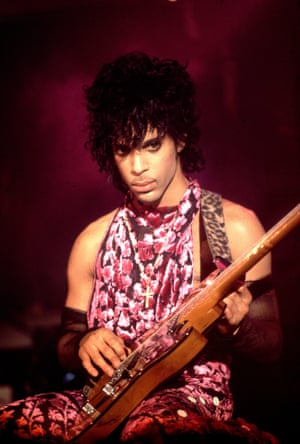‘His queerness was the beginning, not the end point of desire’ … Prince during his Welcome 2 America tour at Madison Square Garden, 7 February, 2011, in New York City. Photograph: Kevin Mazur/WireImage
Prince didn’t write songs about sex. He was sex. Pure and simple. Except it was never pure and never simple unless you were actually Prince and would perhaps meet a girl masturbating with a magazine in a hotel lobby (Darling Nikki). Or a virgin on her way to get married who decides what she really needs to do is to blow you. For ever (Head). Or, you know, that thing where you manage 23 positions in a one-night stand. Sure you do. You know the tune even if you don’t the words. I mean, just look at him.
When I showed my teenager pictures of Prince, she said: “He looks disgusting”. Well, precisely. Did I actually fancy this rather strange little satyr of a man in his funny heels? He confused me, so I was never actually sure what I felt, except what I knew the music made me feel. To see him live was to a see a performer who seemed capable of having sex with every individual member of the audience. Even in the O2. Much has been well said about his sexual ambiguity, which opened up new ways for so many other artists to be. But Prince was doing something perverse on every level, pushing every conventional signifier of race or sex past its limit. This queerness was the beginning, not the end point of desire. What was subversive was that it really didn’t matter how you got off – as long as you did.
His ability to embody the feminine, to utilise it, to play with it – I find androgynous absolutely the wrong word for him - made him unbelievably seductive. Here was a man singing about female desire in a way women understood. His absolute cockiness was always present alongside his willingness to be objectified: a killer combo. Its seems strange now that we debated what Sheena Easton meant when she sang “come spend the night inside my sugar walls”, but we did. Girls gasped at the tonguing and groping in Purple Rain, while their boyfriends just thought he looked gay. But there was something other than these explicit lyrics, something about where he was going with all this that went deeper. He wrote, too, about the bleak side of relationships, and the Aids crisis. For Prince, sex might not save your soul. Only God could do that.
At the time, though – and still now – it was immensely important that such a huge artist surrounded himself with women musicians. He could acknowledge the genius of Joni Mitchell as much as he could that of Jimi Hendrix. And he was funny – always sexy. To see him titivating around a gay woman in Kiss is still brilliantly silly and life-affirming. His imagination, it seemed, would just keep breaking down boundaries until they dissolved altogether. This pushing towards transcendence, which all the best music can do, is what he lived for; the holy trinity of funk and filth and faith met in him. Faith so often seems an intrinsic part of music that takes us to another realm.
When he fantasises about being his girlfriend’s girlfriend, he takes us there. He takes us a different way. The longing is more than physical. The music is an invitation to a orgy. Of whatever kind you so desire, spiritual, physical, emotional. You don’t get too many of those invites in a lifetime. So now take his. Take him home.


No comments:
Post a Comment